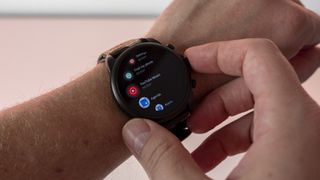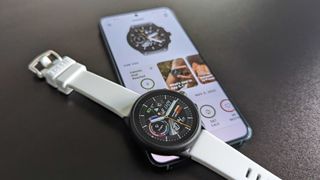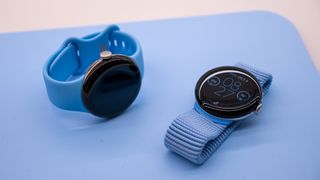Fossil's Wear OS exit shows the platform is both better and less competitive than ever
The late-stage Wear OS comeback has proven troubling for third-party watchmakers.

What you need to know
- Fossil, a fashion and lifestyle company that made Wear OS smartwatches for years, is leaving the market for good.
- The company announced the move in January 2024, but continued to sell smartwatches while supplies lasted.
- Now, there are no more Fossil smartwatches to go around, and there's one less player in the Wear OS smartwatch game.
About three months after Fossil Group announced it would stop making smartwatches, all the existing stock of Fossil's current Gen 6 lineup has been more or less exhausted (via Droid-Life). You can no longer buy a Fossil smartwatch directly from the company's online store (save for maybe a few stragglers), and stock is dwindling at third-party retailers as well. Although Fossil says that it will continue to update sold smartwatches "for the next few years," this development clearly marks the end of Fossil's run as a Wear OS smartwatch maker.
Fossil is hardly a tech-first company, but it had become a household name in both the Wear OS and hybrid smartwatch categories over the last few years. As a traditional watch manufacturer, Fossil attempted to make smartwatches that conveyed the look and appearance of those classic timepieces. More importantly, Fossil stuck by Wear OS during the times that even Google didn't seem fully committed to the platform.
The company's choice to end its lineup of smartwatches spans the Fossil Group, which affects more than just the Fossil brand. The group also covers smartwatches released under Citizen, Skagen, Diesel, Michael Kors, and Kate Spade.
Now that Fossil is finished making smartwatches, the Wear OS market has lost a staple brand. It's the perfect microcosm for the situation affecting Wear OS today. Google and Samsung are more committed to the platform today than at any point in its history, and Wear OS is better than ever. At the same time, it's less competitive because third-party OEMs are struggling to compete with Google and Samsung in the open market.
Why is Fossil done with smartwatches?

The idea that Fossil is exiting the Wear OS smartwatch market due to Samsung and Google's combined dominance isn't exactly speculation, either. In a January 2024 statement, along with the announcement that Fossil's Gen 6 would be its last, Fossil Group said something to that effect.
"As the smartwatch landscape has evolved significantly over the past few years, we have made the strategic decision to exit the smartwatch business," said a Fossil spokesperson. "Fossil Group is redirecting resources to support our core strength and the core segments of our business that continue to provide strong growth opportunities for us: designing and distributing exciting traditional watches, jewelry, and leather goods under our own as well as licensed brand names."
Fossil, talking about how the "smartwatch landscape has evolved significantly over the past few years," is clearly talking about the Wear OS resurgence. Why wouldn't Google and Samsung's newfound appreciation for the platform that powers Fossil products be helpful to the brand? Because those companies are building Wear OS, in part, around their own smartwatch hardware offerings.
Be an expert in 5 minutes
Get the latest news from Android Central, your trusted companion in the world of Android
Google released the Pixel Watch, for example, in October 2022. Google's entry into the Wear OS hardware market came about a year after Fossil originally released its Gen 6 lineup. The success of both the Pixel Watch and Galaxy Watch presumably led Fossil to believe it couldn't compete against the giants.
The Wear OS and hybrid smartwatch market now has one less major player

Fossil's exit is a shame because while Wear OS is becoming more competitive against the Apple Watch, there is less competition within the smartwatch market. In particular, Fossil was known for making great hybrid smartwatches that combined a traditional mechanical clock with smart features and elements. Hybrid watches are an excellent way to get great wearables on the wrists of people who don't just want a screen. Using the company's experience as a traditional watchmaker, Fossil made some of the best-looking hybrid smartwatches available.
Now, the market for high-quality hybrid smartwatches is becoming thin. Just like the broader Wear OS market, the options are better, but there are fewer options. The best hybrid smartwatch today is probably the Withings ScanWatch or a Garmin watch, but neither of those perfectly fills the gap left by Fossil.
In some cases, manufacturers have started supporting Wear OS after seeing the improvements Google and Samsung have made over the last few years. OnePlus added Wear OS to the OnePlus Watch 2, and Xiaomi now has Wear OS offerings once again. However, OnePlus and Xiaomi are both very large tech companies, and while their models are still quite new, brands with tech experience and expertise may be better equipped to survive in the new Wear OS market than those like Fossil.
Bigger tech companies, like OnePlus and Xiaomi, have the resources to compensate for their lack of involvement in Wear OS development. Smaller ones—or brands that specialize in watches or fashion rather than tech—can't figure out how to integrate the new Wear OS with their own strategies, given there's no phone or ecosystem to attach it to. Some brands, like Fossil, will choose to pack up and leave instead.
Wear OS is better than ever — for Google and Samsung

Fossil's decision to exclude itself from the Wear OS market exemplifies the problem. Google and Samsung, the two companies most responsible for developing Wear OS, aren't doing enough to help third-party OEMs. Instead, they're designing and releasing Wear OS upgrades that benefit their own hardware.
For example, Google is debuting a Wear OS 5 preview at Google I/O 2024. There, it'll showcase new features to developers, likely on Pixel Watch devices. Then, the Wear OS 5 upgrade is widely expected to debut on the Samsung Galaxy Watch 7 lineup this summer. Of course, it'll come to Pixel Watch models later this year as well. Unfortunately, Wear OS manufacturers, not Samsung or Google, likely won't feel included in this process.
The issue extends beyond Fossil, too. Mobvoi has clearly struggled to keep up with the pace of Wear OS development — its flagship TicWatch Pro 5 smartwatch still doesn't have proper Wear OS 4 support (though it's supposedly coming), even after its latest version of the watch launched in May. Is Mobvoi to blame here, or is it just too difficult for third-party companies to support new Wear OS versions without being included?
For now, that's unclear. However, it'll be disappointing if more third-party OEMs leave Wear OS. A market with just Samsung and Google in it, no matter how good Pixel and Galaxy watches get, wouldn't be great for consumers.

Brady is a tech journalist covering news at Android Central. He has spent the last two years reporting and commenting on all things related to consumer technology for various publications. Brady graduated from St. John's University in 2023 with a bachelor's degree in journalism. When he isn't experimenting with the latest tech, you can find Brady running or watching sports.
